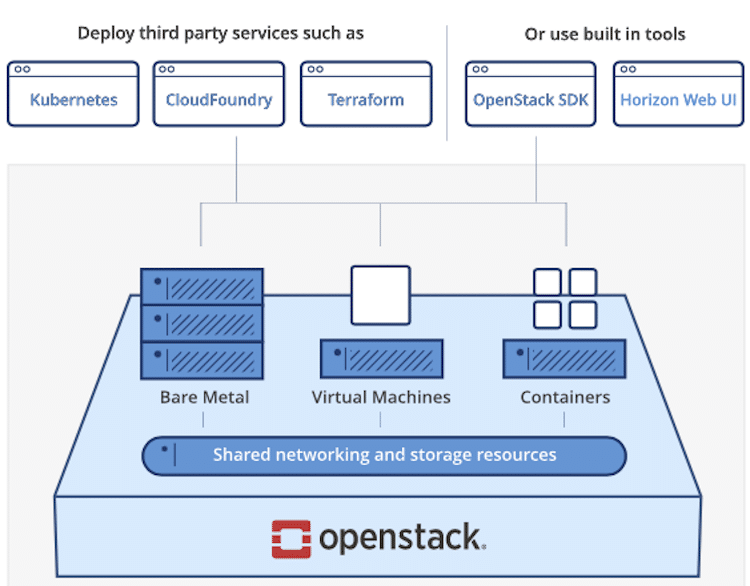OpenStack Zed, the 26th version of the open source cloud infrastructure software, gets released featuring enhanced security and expanded hardware enablement and is available for download. Concurrently, OpenStack introduced Venus, a log aggregation service for large deployments, and Skyline, a dashboard that delivers an improved web UI.
OpenStack Zed, the 26th version of the open source cloud infrastructure software, gets released featuring enhanced security and expanded hardware enablement and is available for download. Concurrently, OpenStack introduced Venus, a log aggregation service for large deployments, and Skyline, a dashboard that delivers an improved web UI.

OpenStack is an infrastructure platform for deploying diverse architectures like bare metal, virtual machines (VMs), graphics processing units (GPUs), and containers. Over 40 million cores are currently in production, and over 180 public cloud data centers are running OpenStack globally. The OpenStack community continues integrating emerging technologies like Ceph, Kubernetes, and Tensorflow.
Ninety percent of the largest global telcos run OpenStack, with users like NVIDIA, Blizzard Entertainment, BBC Research, and the European Centre for Medium-Range Weather Forecasts continuing to bring innovative use cases and technologies to the community. The usability improvements have enabled deployment sizes that range from a few dozen to millions of cores.
Kendall Nelson, senior upstream developer advocate at the OpenInfra Foundation, said:
“In this 26th release of OpenStack, community stewardship and attention to user feedback really shines, both in terms of new security and hardware enablement features and in terms of new projects that are keeping the world’s most popular open-source cloud platform in step with the ever-evolving needs of a user base that continues to grow across industries. We’re 12 years in, and OpenStack deployments continue to grow at an incredible pace. Just a year ago, we celebrated 25 million cores, and we’re already exceeding 40 million cores in production today. It’s exciting to see usage among legacy and new users increase dramatically and also to see the community expand, with organizations like NVIDIA increasing their contributions by 20% this year.”
Zed release expands security, hardware enablement features
The Zed release comprises 15,500 changes authored by over 710 contributors from more than 140 organizations and 44 countries, all accomplished in 27 weeks. Feature advancements in Zed include:
Security enhancements
Cinder: Block Storage API microversion 3.70 allows users to transfer encrypted volumes across projects. Previously only unencrypted volumes were supported for transfer. Also, all snapshots associated with the volume will be transferred with the encrypted volume.
Keystone: OAuth 2.0 support added.
Hardware enablement
Cinder: New backend drivers supporting DataCore iSCSI and FC, Dell PowerStore NFS, Yadro Tatlin Unified iSCSI, Dell PowerStore NVMe-TCP, and Pure Storage NVMe-RoCE storage drivers.
Cyborg: Offers a Xilinx FPGA driver to manage Xilinx FPGA devices, including discovering devices’ info and programming xclbin. Proposes a spec of adding NVIDIA MIG for A100 devices. Multi-Instance GPU (MIG) allows GPUs based on NVIDIA Ampere architecture (such as NVIDIA A100) to be securely partitioned, which is different from the VGPU feature; the MIG driver is compatible with PGPU and VGPU.
Nova: Virtual IOMMU devices can now be created and attached to an instance running on x86 hosts using the libvirt driver.
Projects Skyline and Venus bring improvements
With the Zed release, OpenStack Venus is introduced as a one-stop log aggregation service tailored for operators to collect, clean, index, analyze, create alarms, visualize, and generate reports on OpenStack logs. Venus benefits operators managing large OpenStack deployments, providing a way to solve reported problems quickly, understand platform operational health, and improve platform management.
Skyline is a new OpenStack dashboard project with original code contributed by 99Cloud. Using a technology stack based on React, Skyline features a modern webapp architecture and is designed to manage user requests and multiple current commands better than Horizon. The OpenStack Technical Committee considers Skyline to be in an “emerging technology state” and not yet ready for production.
Learn More at the Open Infrastructure Summit
The OpenInfra Summit will be at the Vancouver Convention Center on June 13-15, 2023. Attendees will have the opportunity to collaborate with those building and running open source infrastructure using Linux, OpenStack, Kubernetes, and over 30 other technologies. Early bird registration is available until February 15, 2023.
Engage with StorageReview
Newsletter | YouTube | Podcast iTunes/Spotify | Instagram | Twitter | TikTok | RSS Feed
